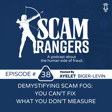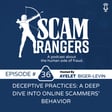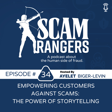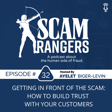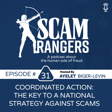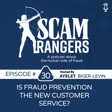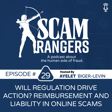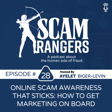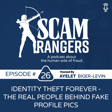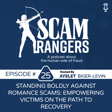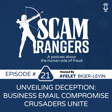Introduction to Scam Rangers and Host's Passion
00:00:03
Speaker
Scam Rangers, a podcast about the human side of fraud and the people who are on a mission to protect us. I am your host, Ayelet Bigger Levine, and I'm passionate about driving awareness and solving this problem.
Emotional Manipulation in Scams
00:00:21
Speaker
Welcome to Scam Rangers.
00:00:23
Speaker
We often talk about the emotional impact of scams on victims. And one of the things that is really challenging for us as we are looking to solve the problem of online scams and stop them in their tracks is the fact that a person who is deep into the scam lifecycle is really in a tricky space in terms of sense of reality.
00:00:48
Speaker
because they're often under emotional manipulation by the time they want to transfer money to the bank.
Challenges Fraud Teams Face
00:00:54
Speaker
They're under this emotional manipulation of someone is convincing them that what they're going to do, the money that they're going to transfer is done for legitimate reasons that either it's their bank fraud team or a friend or someone that they got into a romantic relationship with or some kind of manipulation that makes them believe the cyber criminal versus
00:01:18
Speaker
a legitimate person. And then once the bank fraud team actually calls them because they do suspect that it's a scam, it's really hard to stop it in its tracks because they believe they're talking to someone legitimate.
Meet Tiffany Paulson: Fraud Specialist
00:01:31
Speaker
So today's guest is going to shed some light on what we could do as fraud fighters in order to help victims and help customers of financial institutions and really try and stop scams before they successfully transfer money to cyber criminals.
00:01:52
Speaker
Today's scam ranger is Tiffany Paulson, and she's a fraud specialist at one of the largest credit unions in the US. Previously, she worked for Wells Fargo for 14 years in multiple roles with all levels of consumer and business accounts in multiple different departments, always working on the front lines in customer contact centers.
00:02:15
Speaker
So Tiffany, welcome to the podcast. It's great to have you here. Thank you so much for having me. I'm really excited about today's conversation. Tell me a little bit about your career in the credit union you work with now, because you didn't start on the fraud team, right?
Tiffany's Early Career and Significant Fraud Case
00:02:32
Speaker
No, I didn't. I actually started on the front lines at the call center as a representative.
00:02:39
Speaker
I started about eight years ago when I left the bank, I came to the credit union and I took calls, incoming calls from our 1-800 number. And so I started speaking with our members directly early in my role there. That's actually where the spark started for me to get on that fraud team. I received a call in that representative role and it was a third party actually.
00:03:08
Speaker
looking to verify a check. And it was for hundreds of thousands of dollars. The third party was providing with a lot of information about how a business was going to get opened overseas and just calling to make sure that check was good.
Becoming a Full-Time Fraud Team Member
00:03:24
Speaker
Instantly felt like something was off there. And so I sent it over to the fraud department. And a couple of days later found out that in fact was fraud. So I was
00:03:36
Speaker
happy, you know, definitely that I had stopped that situation. And it definitely lit a fire under me to start my career.
00:03:46
Speaker
down the fraud path. So I definitely, I stayed in my contact center representative role. However, I moved up into like a senior role. It was kind of like an assistant manager kind of where I had like a team of representatives that I would assist. And throughout this whole time, there were multiple occasions where I was coming across fraudulent, you know, situations and accounts.
00:04:11
Speaker
members involved in scams and I just recognized that I had such a passion for it. So I definitely made some moves to get to the fraud team organically through going through operations team and assisting the fraud team with fraud cases that we were dealing with a few years ago. So I got my feet in actually a little bit before I actually joined the fraud team.
00:04:35
Speaker
So you were kind of in the front lines talking to customers also when it came to investigating fraud cases a little bit and then transitioned to the fraud team kind of full-time. Correct. I transferred to the fraud team about three years ago, full-time. Great. So can you tell us about your current role? Kind of what is your day in the life? What do you do today at the credit union?
Fraud vs. Scams: Handling at Credit Union
00:04:58
Speaker
Currently I'm a fraud specialist too. I do have my certificate as a certified fraud specialist.
00:05:05
Speaker
So daily what I do is I respond to alerts that we get through our technology software through suspicious activity through the credit union. So I get alerted to activity and I take a look at our members accounts to see what might be going on.
00:05:24
Speaker
And if it's fraud, then I take care of it from there. I often am reaching out to our members to discuss situations all day long. So we're definitely always reaching out to our members to talk about these situations. What would you say is different when it comes to cases of fraud versus a scam? An authorized versus unauthorized type activity? In my investigations with
00:05:53
Speaker
like scams, that's a lot of our established members that have been banking with us for a long time, straight up fraud, like new account fraud. So a new account to our credit union is one of those things where it's already a red flag that's new. And so depending on what activity you do will brought attention to your account.
Convincing Victims During Ongoing Scams
00:06:16
Speaker
So a lot of times when these scammers open up accounts at our credit union,
00:06:21
Speaker
they act fast. So, you know, they open the account and they want to be making those deposits and making those withdrawals quickly. So it helps with the alerts that we get to be able to look at that account immediately to triage that.
00:06:38
Speaker
with the established member scams, it's a little bit more involved where, you know, you have to really look into the member's profile and see what's going on. You have to talk to them and get their side of the story. Yeah. So when I mentioned, when I gave the intro, I talked about the complexity of them thinking that they're talking to someone who's legitimate and then
00:07:02
Speaker
sometimes you'll call them and you'll try to convince them that they're being scammed or you'll try to first investigate. What are some challenges there and how are you able to convince them? Because it's really a hard task. Tell us a little bit about your experience there.
00:07:20
Speaker
I really appreciate the alerts that we have that alert us to this activity that's possibly in process because that, in my opinion, is a huge part of stopping the scam is calling right in the middle of the interrupting the scam. If someone is involved, let's say in like a remote access scam and they're working with someone that's asking them to do these things with their computer, download these things, transfer this money, they get really wrapped up and a lot of times with these
00:07:47
Speaker
scams or older generation and they don't push back a lot. And so they're doing whatever these people are asking them to do. So when I call in the middle of this, I try to bring them back to reality. I let them know that I'm calling from the institution and we're concerned about the activity that we're seeing.
Strategies to Prevent Scam Progress
00:08:06
Speaker
I ask them, you know, has there been anything to happen recently to
00:08:13
Speaker
have these transactions occur that we're seeing, these anomalies that I'm referring to, most of the time they will, with my call during this time, they will come back to reality and they will say, you know what, I did receive an email and all of a sudden, you know, I'm owing this much money and they're wanting me to send a wire. And then I can tell them, you know, this is a scam. This is what I see every single day. You know, this is your money, you know, things like that,
00:08:41
Speaker
where they they've been being bullied for the last however long sometimes these people are on these calls with these scammers for hours just trying to follow these directions and download these apps and they're so flustered that when I'm calling and I'm saying I'm from the bank I'm seeing strange things can you tell me about that you know what's going on I want them to tell me what exactly is going on so when they tell me yes I was
00:09:08
Speaker
emailed or called or sent a text and I clicked on it. Um, I allowed access, you know, these, they, they tell me these things where I know that that's a scam. I know that that they did, you know, allow the scammer into their system. And so now I have to be the one to let them know, you know, this, this is a fraud. Um, these are not really from that company, you know, as an example to give them facts gently, um, in a way where.
00:09:38
Speaker
you're not scolding them or they're not gonna be in trouble for doing this. A lot of people think that they might get in trouble for doing something like this, but it's always best to reach out to the credit union or to whoever's asking you to send them money, call them directly.
Case Study: Remote Access Scam
00:09:59
Speaker
Don't call the number that's been given to you, bringing someone back from a scam
00:10:04
Speaker
Um, can't be hard. There was one time where I was observing a remote access scam. It was the typical textbook anomalies that I was seeing when I called our member to ask what was going on. You know, I already knew it was going on. So I just wanted her to be honest with me and confirm like my normal other calls, you know, where they agree, you know, I got an email, this and that, this member.
00:10:30
Speaker
She just she was very It was very interesting about how she answered her questions with me. She was evasive. She wasn't rude, but it wasn't forthcoming and I could just tell that she wasn't being honest with me. When I was asking her these questions, you know, did you get an email or did this happen or why
00:10:50
Speaker
And her answer is I just wasn't, I just didn't believe she was being honest and we ended up hanging up the phone after we spoke and I kept the accounts locked because I just, well, the anomalies that I was seeing. So let's break that down a little. That's really interesting because you know that this is,
00:11:09
Speaker
a case of remote access. So she deployed remote access tool on her computer with the guidance of the criminal and that allowed them to take control of her device and do whatever they wanted, right?
Empathy and Patience in Scam Intervention
00:11:24
Speaker
Get into the account and transfer money.
00:11:26
Speaker
and she was being scammed but she also likely was guided by them to you know maybe your bank will call and if they'll call then here's what you need to tell them and oftentimes they actually work with the victim to manipulate them to you know tell them that their bank is in on it like your bank is trying to take control of your account so we're gonna save you and they kind of completely gaslight them into a different situation
00:11:52
Speaker
where they think their bank is in on it and they need to not answer the bank correctly. You know it's a scam and I really like your approach where you didn't call and say you're being scammed because that's a hard pill to swallow and sometimes it's too harsh so you're kind of asking very gently. I think that's a really really interesting approach and to kind of to generalize that
00:12:14
Speaker
First of all, I want to ask what happened at the end of that specific story, but also would love to dive a little deeper into your approach. What makes you successful and what do you bring into these conversations? Probably empathy is one of the key factors, but what else do you bring into your conversation?
Romance Scams: Education and Empathy
00:12:32
Speaker
So let's start maybe with that particular story, how that ended. Yeah. So that lady, that member ended up calling us back and
00:12:40
Speaker
The first question that she asked, she wanted her access back. She wanted online banking back. She was still trying to send this money to these bad actors. And I mentioned to her, I just said, hey, you know, we're just really concerned about the activity. You know, sometimes there's things when members get wrapped up in scams and they're being threatened. And when I said that, she broke down. She didn't cry, but it was like,
00:13:06
Speaker
Oh my gosh, they were threatening me. They were threatening my family. And she was, like I said, older. And so that scared her. And so she was doing whatever they told her to do. They told her to lie to us. They told her to not be honest about what the transfers were for and things like that. They told us to lie. That's what they do. They've gaslit these people so long for an hour or two or whatever it is. And they've got them to
00:13:36
Speaker
agreed to lie to the bank when they call. So when she called back and I told her, this is a scam, this is fraud. They do threaten people. She did tell me that they were threatening her. And so I did. I was able to let her know. I actually, when I speak to our members and they do give me the truth, I thank them for being honest with me. I appreciate that they come forward with what's been happening.
00:14:04
Speaker
They're telling me it's matching what I'm seeing. And so I make sure to thank them for being honest. I let them know that they are not alone in this situation. Unfortunately, this is something that I'm seeing all the time. And I give them things to look into, look into this, look this up. I try to give them some resources to help themselves because
00:14:33
Speaker
chances are this might happen again. I talk to them like they're my family. I've always done that with my entire career. Money is very emotional when you work for a financial institution.
00:14:48
Speaker
When dealing with serious matters, especially something like this, I try to, you know, imagine I'm talking to my grandma or something like that. So it does definitely help with them telling the truth and coming out with everything that happened. They feel more comfortable in talking to me.
00:15:05
Speaker
And what about cases of romance scams? I think when you're the example that you gave about like a help desk, IT help desk scam potentially when like that's very common for remote access or that one time scam where someone is probably, you know, very long session being manipulated, but it's not a recurring thing.
Helping Victims Accept Scam Reality
00:15:24
Speaker
When you're in a relationship or you think you're in a relationship and you transfer money to this
00:15:29
Speaker
do it on an oil rig or on the army overseas and and it happens again and again and you and your systems are able to track these anomalies and the money is sent and maybe you know that the person is recently divorced or widowed or whatever is going on there and maybe even family members who are concerned and reach out to you potentially have heard those cases as well
00:15:50
Speaker
How do you address those types of cases when you reach out to members if you had success in those types of scams? I have. Romance scams are one of the largest scams that we do see. A lot of times these scammers ask them to open up accounts at just random institutions.
00:16:07
Speaker
And so a lot of times they're new, you know, they're new accounts with us. So that's, like I said, it's kind of like a red flag already. And then they, you know, the activity that they do definitely brings our attention. So when they've done things like make a deposit or
00:16:23
Speaker
you know, there's anomalies that we're seeing and we're alerted to it, we give them a call. And we ask, hey, what's going on? It can happen with established members. And it has this specific instance that I'm thinking of that had recently, you know, romance games, they target the lonely and the vulnerable, like you said, if they're widowed or recently divorced, and they're going online and
00:16:48
Speaker
with these people in those situations, they haven't been told these things that these scammers are telling them, you know, these romantic things and, you know, promises of love and marriage, the love bombing. Yeah. And the money, a lot of times they promise them money too. So they're not only promising them love and marriage, but they're saying, Hey, I can also get us
00:17:08
Speaker
millions of dollars and so we can travel around the world. And I'm just saying by the way today, pictures from these types of romance scams where the criminals send like pizza and flowers and teddy bears and they actually send by by mail to their victims things to
00:17:28
Speaker
kind of convince them that this is a real thing. And it can definitely happen with, you know, men and women. It's not just, you know, females that fall for the scam. In this case that I remember, there was a gentleman that I spoke with and he had some anomalies on his account and I called him and I was asking him about them. And he admitted to me that he had a fiance that was out of the country.
00:17:58
Speaker
And she was having some legal problems and she couldn't get home. And so she had this lawyer. So anytime that it goes into that, it's like, I have this fiance from overseas and then all of a sudden there's these problems and I gave, you know, money's coming from other countries. It's just, and they're being told all kinds of different things as to why this is happening and because they're so
00:18:25
Speaker
I don't want to use the word desperate, but they're so hopeful that this is real, that they will do whatever without questioning what they're actually doing.
Implications of Scams and Victim Advice
00:18:35
Speaker
They just want that person to be happy and do what they can to help them. With the romance scams, these people usually have huge hearts and they just want to give their love. And unfortunately, the scammers, they manipulate that into money. So once they get them in love, then they can then
00:18:56
Speaker
get lots and lots, unfortunately, lots of money. So how are you able to untangle that for victims? How do you get to the point? Because it's not just believing that this might be a scam, it's also accepting. Because you're already in it. You already sent money. That's how you guys were able to see that something's going on. You're already knee-high deep in this, if not more than that. So how do you help them untangle it?
00:19:26
Speaker
That's a great question. To help untangle it, you provide them with a fact. Ask them, are you traveling? No. OK. I'm seeing logins from here. Can you explain that? I ask them to, where is your fiance? You're telling me they're here, but they're actually logging in from here. So do you know why that might be? So I ask them questions to get them really thinking about all the lies that they're being told.
00:19:54
Speaker
You know, I explained to them as far as like online banking, like nobody should have access to that. That should just be yours. You know, these accounts, you know, that are, the money's coming from, are those your accounts? Like there's just things that with banking, like you can't do. And so I explained to them like this, what you're doing, like you may not be aware of it, but this is, you know, as far as the bank sees,
00:20:22
Speaker
I let them know it's a form of money laundering, so I let them know that this is a serious situation that they're in it's not just romance it's.
Psychology's Role in Fraud Prevention
00:20:32
Speaker
they've actually taken the steps to open accounts to allow credentials to deposits are being made so things are happening that now it's it's more than just.
00:20:43
Speaker
they've been lied to. They're in a way participating, but they don't exactly know that they are. So when I spell it out for them, they kind of start to put the puzzle together that, you know what, this isn't right. And I did have red flags that popped up and I didn't listen to them.
00:21:03
Speaker
So it's it is hard to be the person to deliver that information and I always tell them that like I hate to be this person to tell you this. But I really want you to really look into this person, you know, don't talk to them anymore. This is not the real person they're claiming to be.
00:21:19
Speaker
Yeah. They're not coming. They're not going to meet you in the airport. They're not coming to come live with you. And I think it's a really fine line because you, you don't want to be someone who's scaring them into like, this is money laundering or collaborating with crime. And they're already suffering through all the emotional toll of the scam itself and the relationship not being real, but sometimes a strong
00:21:44
Speaker
And we had an earlier episode, we had a private investigator told us about all the family members really worrying about their relative who was being scammed and the need to.
00:21:56
Speaker
to, you know, get either the police involved or get or prove that this is not the right person and even with all those facts it was really hard for them to convince at times, people, because again they're they're so emotionally involved in this so it's kind of a very fine line and what I liked about what you said is like I hate to be the person to tell you that's again a sign of empathy.
00:22:19
Speaker
Tell me a little more about your ability to bring empathy into this conversation and your background, because I think that is a big part of it, that the ability to kind of not only use facts, as I think often front fighters, very analytical, you know, looking for the needle in the haystack. What are these methods and how do they look like other things we've seen before? Very, very analytical piece, but there's also a big, big psychological aspect that you're dealing with here.
00:22:47
Speaker
Yeah, actually, right out of high school, I did actually start studying psychology. I wanted to be a psychologist or counselor to me. I did start my college studies with psychology and different courses there. It was an extension of high school, so I didn't really stick with it.
00:23:06
Speaker
I had bills that need to be paid, so that's when I started working at the bank. But I had that foundation of the psychology. And I've always been interested in people and situations and connecting with people. And I've always found that in financial things, like I mentioned before, it's emotional, regardless of if your accounts overdrawn or
00:23:28
Speaker
whatever it is, you can't make your car payment. People are very emotional when it comes to their money. And so if you don't have that empathy or that compassion, you're not going to get through to people. And so, um, I have found that when, you know, when I take the time to have them tell me what's going on. Um, and I just let them talk. I listen, I listen for, for them to tell me everything that's been going on so that
00:23:55
Speaker
I'm not just coming in there and saying, you've been scanned and I see this. And, um, I want to hear their story. I've been scanned long time ago, way, way long ago, you know, when I was on the dating sites, I had some people that were scamming me. I didn't send any money or anything like that, but I had the, the, you know, people claiming to be in the military and things like that. So I have experienced what these people.
00:24:21
Speaker
are going through, and so I can put myself in their shoes. And like I said before I talked to them like they're my family. I really do and I feel that they can feel that. Yeah, and I, first of all, that's, I'm sorry to hear and
00:24:35
Speaker
I think we all kind of, we all have our scam stories because it's so pervasive. And I think the fact that it's so pervasive makes me rethink what a certified fraud examiner should look like in the coming future because we know it's all about the forensics and the facts and all that. But I'm wondering if we need to infuse another element here of psychology with the growing scam attack vector because it's,
00:25:03
Speaker
just we can see the reports from the FBI and the whole conversation about liability and the new programs that the UK government and the Australian government have put out and liability that's coming to several financial institutions around the world. So with all that happening
00:25:21
Speaker
Do we need to rethink our approach to handling scams and investigating and really putting more empathy in this whole process to be able to navigate better as fraud fighters in the space? So what is your biggest concern when it comes to what you're seeing in the scams landscape and what you're hearing from your peers in the industry?
Concerns About Information Security
00:25:45
Speaker
in challenges of tackling this and kind of as a front fighter, well not psychologist but the pretty robust background in thinking about all of this from a psychological perspective as well. One of the concerns I do have is all of the information breaches that have happened and all the information that's out there on the dark web that we don't really have a lot of control over
00:26:09
Speaker
Unfortunately, you know, there was a huge, um, credit bureau that had a leak, um, medical companies, fad leaks, credit card companies, right. Their systems get compromised. And so with all of that information out there, unfortunately these bad actors know that and they go there specifically to, to get the information on us. So it's almost like an unlimited source of.
00:26:34
Speaker
identities for these people to play on. And that is, it is a bit overwhelming when you think about it, but we can only handle it one at a time. That is concerning as far as the amount of activity that's out there. Also something that concerns me is our personal email hygiene. A lot of people have compromised emails and they don't even realize it. They've been using the same password for years. They use the same login credentials.
00:27:02
Speaker
for all of their different profiles. And then they might not even know that someone has compromised their email and they're just using it right along every day. And someone else is too, to do fraud and they don't know that. So, you know, as a general rule, we should always be updating our passwords often and not using the same ones for different accounts.
Hope in Collaboration and Technology
00:27:22
Speaker
So those are two concerns I do have. Right. And that, that leaked information on the Darkwave, it's kind of a hit list. Like we have your number.
00:27:30
Speaker
So now we know who you are and your numbers. So we have the cyber criminals have the ability to kind of build rapport with the individual by knowing a little too much about them and using that data to build credibility and start the scam and start the emotional manipulation. So, absolutely. And I would love to wrap up with a little bit of hope and ask you, what are you hopeful about and what you're seeing in this landscape?
00:28:01
Speaker
I am hopeful that with the combination of education, technology and teamwork that we can make a difference. Um, education is huge, but it needs to be talked about these scams. A lot of times people are embarrassed of what they've been going through and what they're, what they're dealing with. Um, the shame about the scams and stigma needs to be removed. I am hopeful that, you know, people like you are talking about it and people are so passionate about this. And I really do feel that.
00:28:30
Speaker
We are getting the word out and we are educating everybody on all this stuff.
Conclusion: Empathy and Innovation
00:28:35
Speaker
It's all new to a lot of people, but I think that with our teamwork and collaborating with technology, it definitely helped me in my career. So I can definitely hope that that's happening around the country. So that definitely does make me hopeful. Thank you.
00:28:56
Speaker
And, you know, I really think that there is a lot that fraud fighting teams can take from this conversation and their approach. I know I talk often to financial institutions and they tell me when you transfer them or when you detect the scam during the transfer, it's too late. We can't stop it. Like our chances in stopping it are very, very low. But I think with putting some more thought into it and more
00:29:21
Speaker
empathy and maybe it needs to be kind of a hybrid team of people who have some more robust background in psychology and the fraud fighters that are more analytical and that fusion combination in the investigations as well. Maybe that approach will raise the percentage of success as well. Really, thank you so much for sharing your insights with us.
00:29:46
Speaker
And I wish you and your team a lot of success along the way in this journey. Of course. Yes, thank you so much for having me. I really do appreciate it. Thanks so much. Thank you.
Staying Informed and Verification Tools
00:29:57
Speaker
If you want to keep up with trends and online scams, regulatory developments, and everything news regarding this topic, follow me on LinkedIn. Ayelet Bigger Levine.
00:30:10
Speaker
In addition, if you encounter a message that looks like it's suspicious, you can now validate it through a new website called scamranger.ai. Click on validate a message and you'll get both an evaluation of the level of risk of that scam and guidance on what you should consider to verify this message. Let me know what you think.



